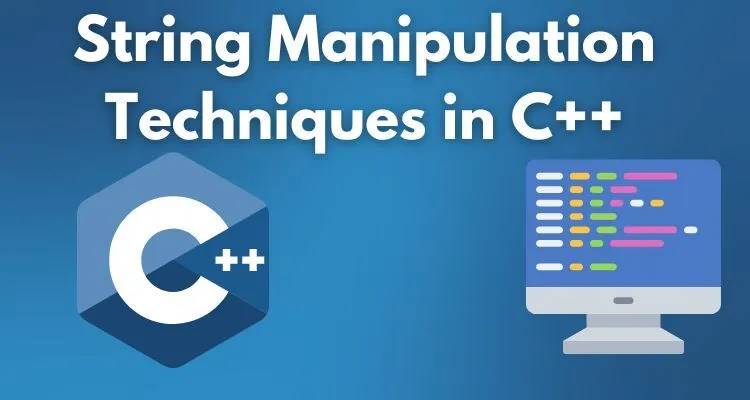- Home
- -Blog
String Manipulation Techniques in C++

- 14 May 2024
- Admin
String Manipulation Techniques in C++
String manipulation is a fundamental skill in C++ programming, enabling developers to efficiently manage and modify text data. It encompasses a variety of operations such as concatenation, splitting, finding substrings, and pattern matching, each crucial for different programming scenarios.
Importance and Common Use Cases
- Data Parsing: Breaking down large datasets, such as CSV files, into manageable parts.
- User Input Validation: Ensuring that user inputs meet specific criteria.
- Text Processing: Handling and transforming text in applications like text editors or word processors.
- Algorithm Implementation: Using strings in search, sort, and pattern recognition algorithms.
Mastering these techniques enhances code efficiency and functionality in many applications.
Concatenation
Definition: Combining two or more strings into one.
Methods:
- Using + operator: Concatenates strings directly.
- Using append() method: Appends one string to another.
- Using += operator: Adds one string to another and assigns the result to the first string.
Examples:
Using + operator:
std::string str1 = "Hello, ";
std::string str2 = "world!";
std::string result = str1 + str2; // Result: "Hello, world!"
Using append() method:
std::string str1 = "Hello, ";
std::string str2 = "world!";
str1.append(str2); // str1: "Hello, world!"
Using += operator:
std::string str1 = "Hello, ";
std::string str2 = "world!";
str1 += str2; // str1: "Hello, world!"
Each method serves the same purpose but can be chosen based on coding preferences or specific requirements in different scenarios.
Performance Considerations: Efficient Memory Usage
When concatenating strings in C++, efficient memory usage is crucial to maintain optimal performance, especially when dealing with large strings or numerous concatenation operations.
Tips for Efficient Memory Usage:
- Avoid Multiple Small Concatenations: Each concatenation may result in a new allocation and copy operation.
- Preallocate Memory: Use reserve() to allocate sufficient memory beforehand if the final size is known.
- Use append() for Multiple Appends: This can be more efficient than repeatedly using the + operator.
Example:
std::string str1 = "Hello, ";
std::string str2 = "world!";
str1.reserve(str1.size() + str2.size()); // Preallocate memory
str1.append(str2); // Efficient concatenation
Splitting Strings
Definition: Dividing a string into substrings based on a delimiter.
Methods:
Using find() and substr():- This method involves locating the delimiter within the string using the find() function and then extracting substrings using the substr() function.
- This method uses the std::stringstream class to extract substrings from a string based on a specified delimiter.
Examples:
Using find() and substr():
std::string str = "one,two,three";
size_t start = 0;
size_t end = str.find(',');
while (end != std::string::npos) {
std::string token = str.substr(start, end - start);
// Process token
start = end + 1;
end = str.find(',', start);
}
std::string lastToken = str.substr(start);
Using std::stringstream:
std::string str = "one,two,three";
std::stringstream ss(str);
std::string item;
while (std::getline(ss, item, ',')) {
// Process item
}
Performance Considerations:
- Handling large strings: Both methods involve multiple allocations and operations, so be mindful of the overhead when working with large strings. std::stringstream can be more convenient and sometimes more efficient for this purpose.
Finding Substrings
Definition: Locating a substring within a string.
Methods:
- Using find() and rfind():
- find(): Searches for the first occurrence of a substring within a string.
- rfind(): Searches for the last occurrence of a substring within a string.
Examples:
Using find():
std::string str = "hello world";
size_t pos = str.find("world");
if (pos != std::string::npos) {
// Substring found
}
- This code finds the first occurrence of "world" in the string "hello world". If found, it returns the position index; otherwise, it returns std::string::npos.
Using rfind():
std::string str = "hello world world";
size_t pos = str.rfind("world");
if (pos != std::string::npos) {
// Last occurrence of substring found
}
- This code finds the last occurrence of "world" in the string "hello world world". If found, it returns the position index; otherwise, it returns std::string::npos.
Using std::string::npos:
- std::string::npos is a constant that represents a non-existent position within a string, commonly used to check if a substring was not found during a search operation.
Performance Considerations:
- Optimal Search Algorithms:
- Ensure efficient substring searching, particularly in large strings, to avoid performance bottlenecks.
- Consider using advanced search algorithms like Knuth-Morris-Pratt (KMP) or Boyer-Moore for better performance in specific cases.
Pattern Matching
Definition: Identifying patterns within strings.
Methods:
Using std::regex:- The C++ Standard Library provides the
header, which includes classes and functions for regular expression processing.
Using Custom Algorithms:
- Implementing manual search algorithms tailored to specific pattern matching needs, such as the Knuth-Morris-Pratt (KMP) or Boyer-Moore algorithms.
Examples:
Using std::regex:
#include <iostream>
#include <regex>
int main() {
std::string text = "hello world";
std::regex pattern("w.rld");
if (std::regex_search(text, pattern)) {
// Pattern found
std::cout << "Pattern found!" << std::endl;
}
return 0;
}
Performance Considerations:
- Regular Expressions vs. Manual Search:
- Regular expressions provide powerful and flexible pattern matching but can be slower for simple searches due to their complexity.
- Custom algorithms like KMP or Boyer-Moore can be more efficient for specific patterns and large datasets, offering better performance in some cases.
Using regular expressions allows for concise and readable code, while custom algorithms can be optimized for performance in particular scenarios. Consider the trade-offs based on the complexity and size of your data when choosing between these methods.
Conclusion
String manipulation is a vital skill in C++ that enhances your ability to handle and modify text data efficiently. Techniques like concatenation, splitting, finding substrings, and pattern matching are essential for a wide range of applications, from data parsing and text processing to user input validation and algorithm implementation. For more in-depth information, visit our guide on Comparing Strings in C++. Mastering these methods not only improves your code's functionality but also its performance.
Practice the provided examples to reinforce your understanding and proficiency in string manipulation techniques. Consistent practice will help you become more adept at writing efficient and effective C++ code.



